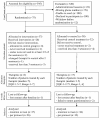The short-term effect on alliance and satisfaction of using patient feedback scales in mental health out-patient treatment. A randomised controlled trial
- PMID: 23034077
- PMCID: PMC3502393
- DOI: 10.1186/1472-6963-12-348
The short-term effect on alliance and satisfaction of using patient feedback scales in mental health out-patient treatment. A randomised controlled trial
Abstract
Background: The main aim was to investigate the effect of using two brief feedback scales in mental health out-patient treatment six weeks after starting treatment, compared to treatment as usual. Hypotheses were that use of feedback scales would improve treatment alliance and patient satisfaction.
Methods: An open parallel-group randomised controlled trial was conducted in an out-patient unit in a mental health hospital in Central Norway. Eight therapists trained in using the feedback scales in the Partners for Change Outcome Management System (PCOMS) treated the intervention group. Seventeen therapists treated the controls, providing treatment without using feedback scales. The main outcome measures were treatment alliance and patient satisfaction.
Results: Seventy-five patients participated. There were no differences between the groups in the intention to treat (ITT) analyses on alliance (mean difference = 0.08, 95% CI -0.44, 0.59, p = 0.760) or satisfaction (mean difference = 0.24, 95% CI -1.85, 2.32, p = 0.819), and no statistically significant differences between the groups in the per protocol (PP, n = 58) analyses on alliance (mean difference = 0.32, 95% CI -0.84, 3.16, p = 0.137) or satisfaction (mean difference = 1.16, 95% CI -0.84, 3.16, p = 0.248) six weeks after the treatment started. The effect size in favour of the PCOMS group increased from 0.07 for alliance and 0.06 for satisfaction in the intention to treat analysis to 0.40 on alliance and 0.31 for satisfaction in the per protocol analysis. Among the other outcomes, the PCOMS group had better motivation for treatment (estimated mean difference ITT: 0.29, 95% CI 0.00 to 0.57, p = 0.05, PP: 0.28, 95% CI 0.04, 0.52, p = 0.024).
Conclusion: Six weeks after starting treatment, there were no effects on alliance and satisfaction from using two brief feedback scales. Since the per protocol analyses showed higher effect sizes, future investigations in a larger study with longer follow-up are warranted.
References
Publication types
MeSH terms
LinkOut - more resources
Full Text Sources
Medical
Miscellaneous


